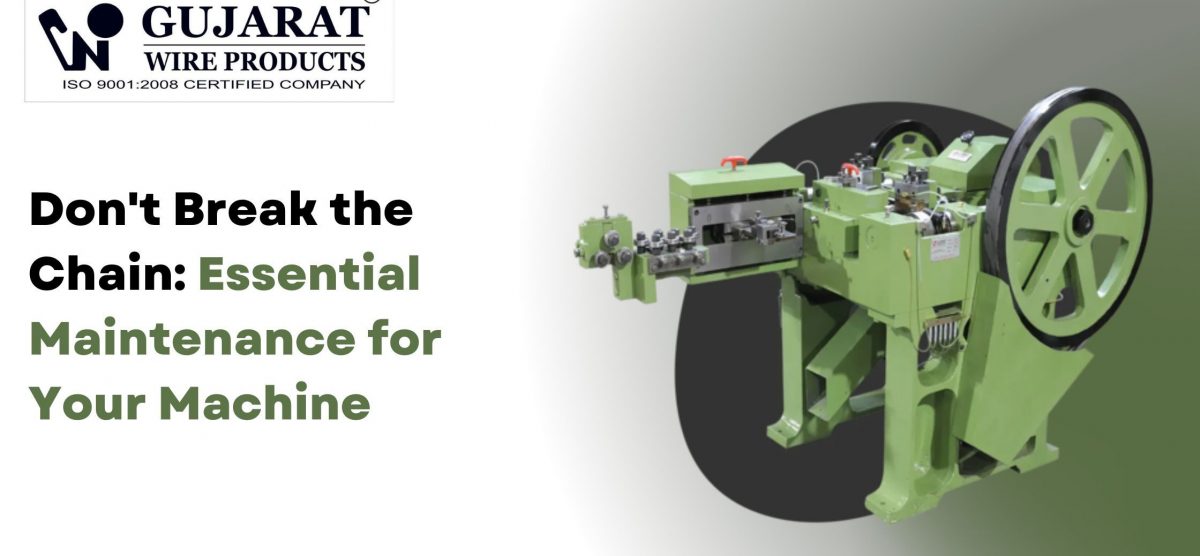Blog

Don’t Break the Chain: Essential Maintenance for Your Machine
In today’s high-demand construction, fencing, and security industries, chain link fencing machines are the backbone of rapid, reliable mesh production. These automatic chain link machines keep projects efficient and profitable—but only if they run smoothly. Regular maintenance is more than a chore; it’s central to maximizing throughput, reducing costly breakdowns, and extending equipment lifespan. Gujarat Wire Products, a trusted name in precision machinery, shares expert insight on how to keep your chain link machine in optimum shape.
Understanding Your Chain Link Machine and Its Components
To get the most from your machine, start by understanding its crucial parts:
- Main frame and feeding rollers
- Wire straightening unit
- Weaving and cutting mechanism
- Lubrication and drive system
- Control panel (manual or PLC automation)
A clear grasp of these components will help spot issues early and perform targeted checks or servicing.
Daily Inspection Checklist: The Key to Non-Stop Operation
Make these quick checks a habit before each shift:
- Inspect all wire guides and feeding rollers for dirt, kinks, or wire remnants.
- Check oil and grease levels in all lubrication points and reservoirs.
- Listen for abnormal noises (grinding, clicking, or motor strain).
- Ensure all emergency stop buttons and safety covers are firmly in place.
- Confirm wire spools are loaded correctly and the straightening device is free-moving.
Regular daily inspections catch early wear, prevent jams, and ensure products meet your quality standards.
Lubrication: The Lifeline of Longevity
Lubrication is essential to smooth operation and long life for automatic chain link machines:
- Use high-quality lubricants compatible with your machine’s bearings, gears, and movable joints.
- Grease the main chains, cam rollers, and guide rails as per the recommended schedule (usually daily or after every 8-hour run).
- Never over-lubricate—excess oil attracts dust and wire debris, causing sticky build-up.
- Wipe away old grease and dirt before fresh application.
Proper lubrication minimizes friction, heat, and noise, reducing the risk of catastrophic wear or seizing.
Scheduled Preventive Maintenance: Go Beyond the Basics
While daily checks are essential, a deeper monthly or quarterly inspection is vital to preventing costly downtime:
- Tighten all bolts, nuts, and fasteners. Vibration can loosen essential connections.
- Examine electricals and PLCs. Look for loose wires, corrosion, or burnt smells. Clean control panels with a dry cloth.
- Survey chain tension and alignment. Adjust chains that have stretched or drifted from their guides.
- Replace worn or damaged cutters, dies, and mesh forming tools. Dull parts reduce quality and strain motors.
- Check sensor performance if your machine features auto-stop or jam sensors.
A structured maintenance schedule not only saves money but also creates a safer workplace and maintains product standards.
Cleaning Routine: Keep it Dust- and Debris-Free
- After every use, blow or brush away wire pieces, shavings, dust, and lubricant residue.
- Clean the wire feeding channel and cutting area meticulously.
- Avoid water near electrical parts; use dry rags for wiping down panels and sensors.
A pristine machine runs quieter, stays cooler, and produces more attractive mesh rolls.
Calibration and Adjustment: Precision is Profit
Even small misalignments in the straightening rollers, mesh size settings, or cutting assemblies can result in inaccurate mesh or poor wire weave. Key best practices:
- Periodically calibrate mesh-size selectors and check measurement units for accuracy.
- Adjust tensioners as wires or chains stretch with use.
- Always recalibrate after tool replacement or major component servicing.
Troubleshooting Common Problems
| Problem | Typical Cause | Solution |
| Wire jamming | Dirty guides, dull cutters | Clean parts, sharpen/replace cutters |
| Irregular mesh size | Misaligned settings, loose fasteners | Recalibrate machine, tighten connections |
| Machine noise/vibration | Poor lubrication, worn parts | Lubricate well, replace worn components |
| Electrical faults | Loose wires, dirty contacts | Tighten/clean electrical connections |
| Motor overheating | Overload, poor maintenance | Reduce load, clean and lubricate motors |
Operator Training: Build a Culture of Care
Well-trained operators are critical. Gujarat Wire Products emphasizes:
- Thorough training on machine start-up, shutdown, and emergency procedures
- Familiarity with daily inspections, lubrication protocols, and safety systems
- Ongoing refresher sessions to reinforce best practices and introduce new upgrades
Empowered operators prevent breakdowns and consistently deliver quality output.
Using Only Genuine Spare Parts: Don’t Cut Corners
Always use original replacement parts and lubricants. Non-genuine components often wear faster, stress the system, and can void manufacturer warranties. With Gujarat Wire Products, expect a reliable supply of high-quality spare parts, minimizing downtime and ensuring consistent production.
Leveraging Smart Upgrades and IoT Integration
Modern chain link machines benefit from automation and monitoring add-ons:
- Sensor-based jam detection and auto-shutdown
- Remote monitoring of production, lubrication alerts, and energy use
- Predictive maintenance scheduling, reducing unplanned breakdowns
These technologies boost machine uptime and reduce manual oversight.
Safety First: Protecting Operators and Machines
- Never bypass safety guards or operate with exposed moving parts.
- Keep the workspace uncluttered and dry; spilled oil or wire bits can cause slips.
- Disconnect power before any repair or cleaning of internal machine components.
Safety is not negotiable—consistent adherence lowers accidents and preserves machinery.
Frequently Asked Questions (FAQs)
Q: How often should I lubricate my chain link machine?
A: Follow manufacturer guidelines—generally daily or after every 8 hours—focusing on chains, gears, and high-motion joints.
Q: What signs suggest my machine needs servicing?
A: Increased noise, wire jams, inconsistent mesh, or overheating are all warning signs requiring immediate attention.
Q: Can I use any oil or grease?
A: No, use only high-quality lubricants approved for your machine model. Cheap substitutes increase wear and reduce performance.
Q: How can I get parts or technical support from Gujarat Wire Products?
A: Contact their expert team for prompt spares delivery, troubleshooting, and on-site service if required.
Conclusion: Invest in Maintenance, Reap Continuous Rewards
Maintaining your automatic chain link machine isn’t just smart business—it’s the only way to guarantee long-term performance, safety, and profitability. With Gujarat Wire Products as your partner, expert support, and access to genuine parts, you’ll produce stronger, more attractive mesh and enjoy trouble-free operation for years to come.
Don’t break the chain—embrace essential machine maintenance and let Gujarat Wire Products keep your operations running seamlessly.
